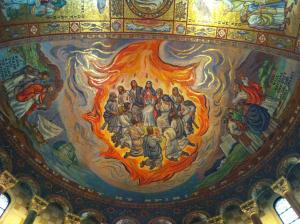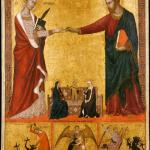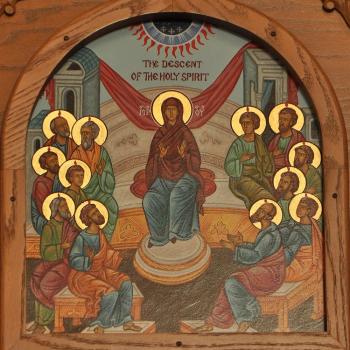 The story of the Tower of Babel allegorically demonstrates the way sin divides humanity. Avarice, hate, and pride are not only temptations which we face on a daily basis, we find that when we embrace them, we begin to divide ourselves from the rest of humanity, cutting ourselves off from the common good. With vainglorious self-deification, humanity sets itself up for a fall in which every man and woman become focused upon themselves above all others, losing not only the common good, but also the means to properly interact with each other, to understand each other, has been lost. Even if they speak the same language, they use words to deceive each other instead of to communicate the truth, so that there is no longer a sense of common speech.
The story of the Tower of Babel allegorically demonstrates the way sin divides humanity. Avarice, hate, and pride are not only temptations which we face on a daily basis, we find that when we embrace them, we begin to divide ourselves from the rest of humanity, cutting ourselves off from the common good. With vainglorious self-deification, humanity sets itself up for a fall in which every man and woman become focused upon themselves above all others, losing not only the common good, but also the means to properly interact with each other, to understand each other, has been lost. Even if they speak the same language, they use words to deceive each other instead of to communicate the truth, so that there is no longer a sense of common speech.
Triumphally raising particular goods over the common good, glorying in that particular, lesser good, elevating it up to a status beyond its station, can only lead to destruction because no particular good can stand on its own apart from the greater and universal common good and remain good. As we elevate ourselves and what we believe to be good above the common good we turn ourselves away from the good we will find that the good which we have attached ourselves to will crumble and fall, leaving us picking up the pieces of our lives in the aftermath. We might know the little good which we have taken in unto ourselves, but we cannot know the good which others have which we have neglected, and so we end up confused and indeed hostile to those promoting elements of the common good which we have neglected.
We need each other. For our own particular good to be realized, it needs is basis to be in, and not standing against or trying to override, the common good. We need to realize we are greater together as one than when we separate ourselves from each other and try to make something great of ourselves by pitting ourselves against everyone else. We need each other. We need to realize that we are meant to be one, reflecting in our unity the image and likeness of God, who is one and yet known in and through a plurality of persons.
We are called to be one (cf. Jn. 17:2). In Jesus Christ, this is possible, for as we are baptized into Christ we put on Christ, entering into the body of Christ. We are called to be one, and through grace, that which has divided us, turned us away from each other, and made us incapable of communicating with each other is able to be overturned. Grace heals the damage done to the common good by sin, enabling that which was once cut up and divided to be restored to its integral unity.
After his ascension after his entrance into the kingdom of God, Jesus sent the Holy Spirit upon his disciples:
When the day of Pentecost had come, they were all together in one place. And suddenly a sound came from heaven like the rush of a mighty wind, and it filled all the house where they were sitting. And there appeared to them tongues as of fire, distributed and resting on each one of them. And they were all filled with the Holy Spirit and began to speak in other tongues, as the Spirit gave them utterance (Acts 2:1-4 RSV).
At his baptism, the Holy Spirit had come upon the humanity of Jesus. Now, thanks to his ascension, and therefore, to his universal presence in all of creation, the Holy Spirit is able to be shared with all who join themselves to Jesus. They are to be lifted up into the second Adam, coming together as one in him, establishing through grace, the integral unity which God intended, before they find themselves deified by Jesus, becoming gods by Grace. By becoming a part of the body of Christ, they are called to share in his Godmanhood, and with it, the treasury of blessings of the kingdom of God. For now Jesus shares with them the Holy Spirit, the Lord and Giver of Life, the sanctifier who raises them up and makes them adopted children of God.
We called to be one in Christ. As egotistical self-deification has led humanity to become divided upon itself, so dying to the self is the means by which we open up to the blessings of the Holy Spirit and find ourselves workers for the common good. Together, in Christ, we find ourselves stronger and better; together, we find truly who we are meant to be, overcoming all false perceptions of ourselves as we become true persons in Christ.
The Tower of Babel represented, the destruction of the integral unity of humanity. Once divided from each other, we could not understand each other. Pentecost reveals the beginning of the restoration of that integral unity in time, in the birthing of the church. The unity which is established in Christ brings the glory of the Holy Spirit to us, a glory which allows us to speak truly, graciously, in love, and so to be understood by each other:
When the most High came down and confused the tongues, He divided the nations; But when he distributed the tongues of fire He called all to unity. Therefore, with one voice, we glorify the All-holy Spirit! (Kontakion of Pentecost)
The confusion of tongues, the division of humanity unto many nations, reveals the destruction of human nature as humanity forms rival groups which fight and contend against each other. As time goes by, the division is reified, walls of hate form as new subdivisions and rivalries form. Sexism, racism, nationalism, and the like, all demonstrate the destruction of humanity as the common good, and indeed, the common goodness found in each human person, is ignored. Pentecost allows all of this to change. Through the Holy Spirit, all the walls which have been erected to divide humanity are to be thrown into purifying fire of God’s love; the Holy Spirit, coming upon the apostles with tongues of fire, begins with the apostles and slowly leads others to see the new, reformed and deified humanity taking place upon earth. As the apostles were drunk with love, so they danced around all their former contentions, speaking and sharing with all the peace and love of Jesus Christ. The kingdom of God came upon them and they did not seek to hold it unto themselves alone, but rather, they felt the Spirit move them to share it with others, to reveal the universal kingdom of God and to speak out in love. This is why, at Pentecost, when the apostles came together, not only did they come to know and understand each other better, but those around them also heard and understood as the walls of division were overcome. Those witnessing the marvel of Pentecost felt the bonds of love drawing them in together, to become one in glory, one in the kingdom of God.
In Pentecost we are shown the truth of humanity. It is one even as God is one. There is to be neither male nor female, Jew or gentile, poor or rich; there is to be no oppressors nor oppressed; there is to be no selfish rivalry but rather, a desire to help everyone become lifted up and gloried in the Spirit. For there is to be but one humanity, the body of Christ, which is permeated by the Holy Spirit. What the apostles experienced, we too can experience, if we but put away all that separates us from love. While what happened at Pentecost can be said to be a historical event, we must not assume that it all that it is; it is rather a manifestation of the universal truth of Godmanhood, of God’s intention for humanity. It is the realization of the kingdom of God on earth as it is in heaven, and therefore, it is the revelation of the kingdom of God among us, and if we but open our hearts, the tongues of fire can come upon us as well.
[Image=Pentecost Mosaic. Photograph by Pete unseth [CC BY-SA 4.0 (https://creativecommons.org/licenses/by-sa/4.0)], from Wikimedia Commons]
Stay in touch! Like A Little Bit of Nothing on Facebook












